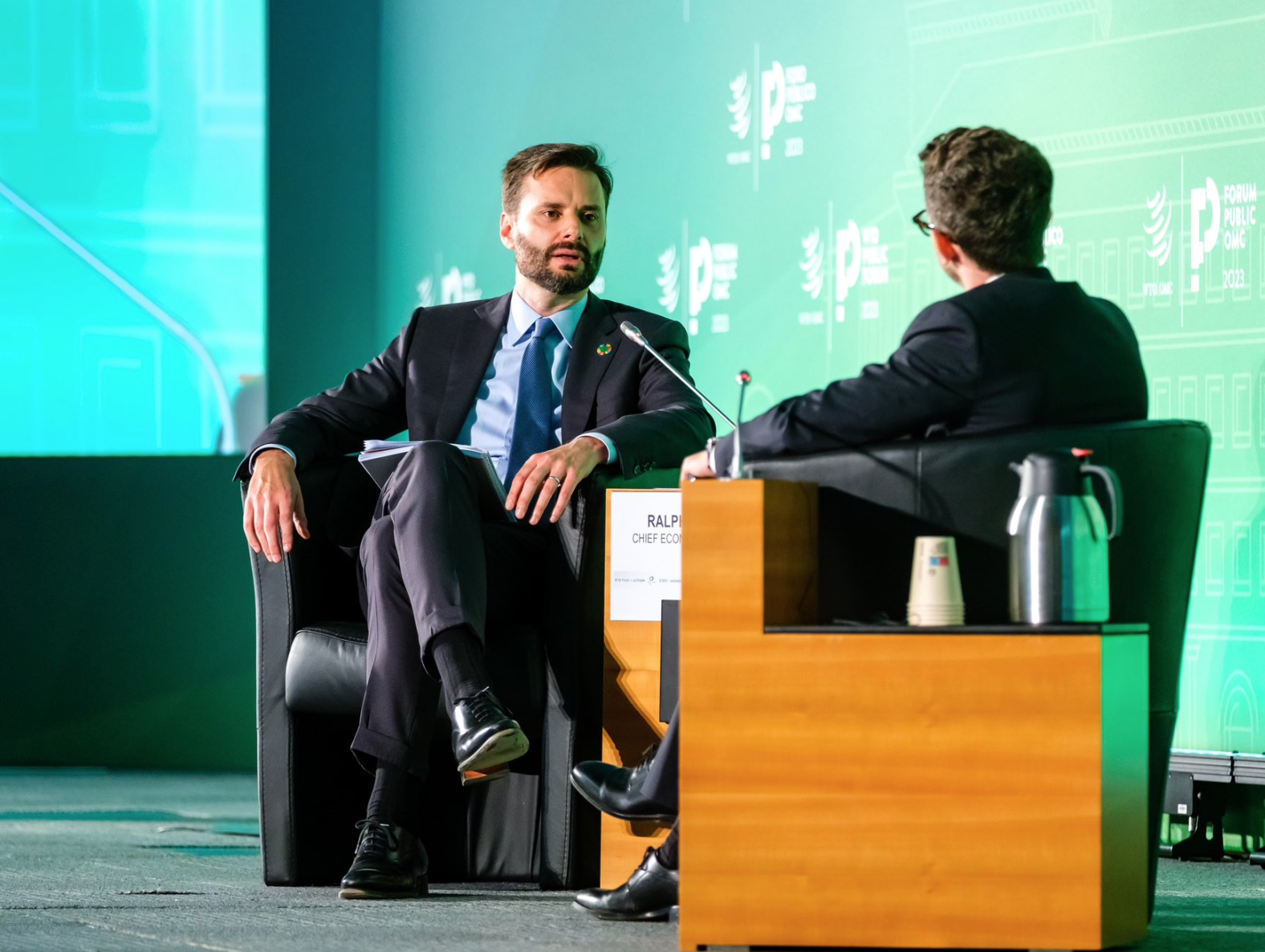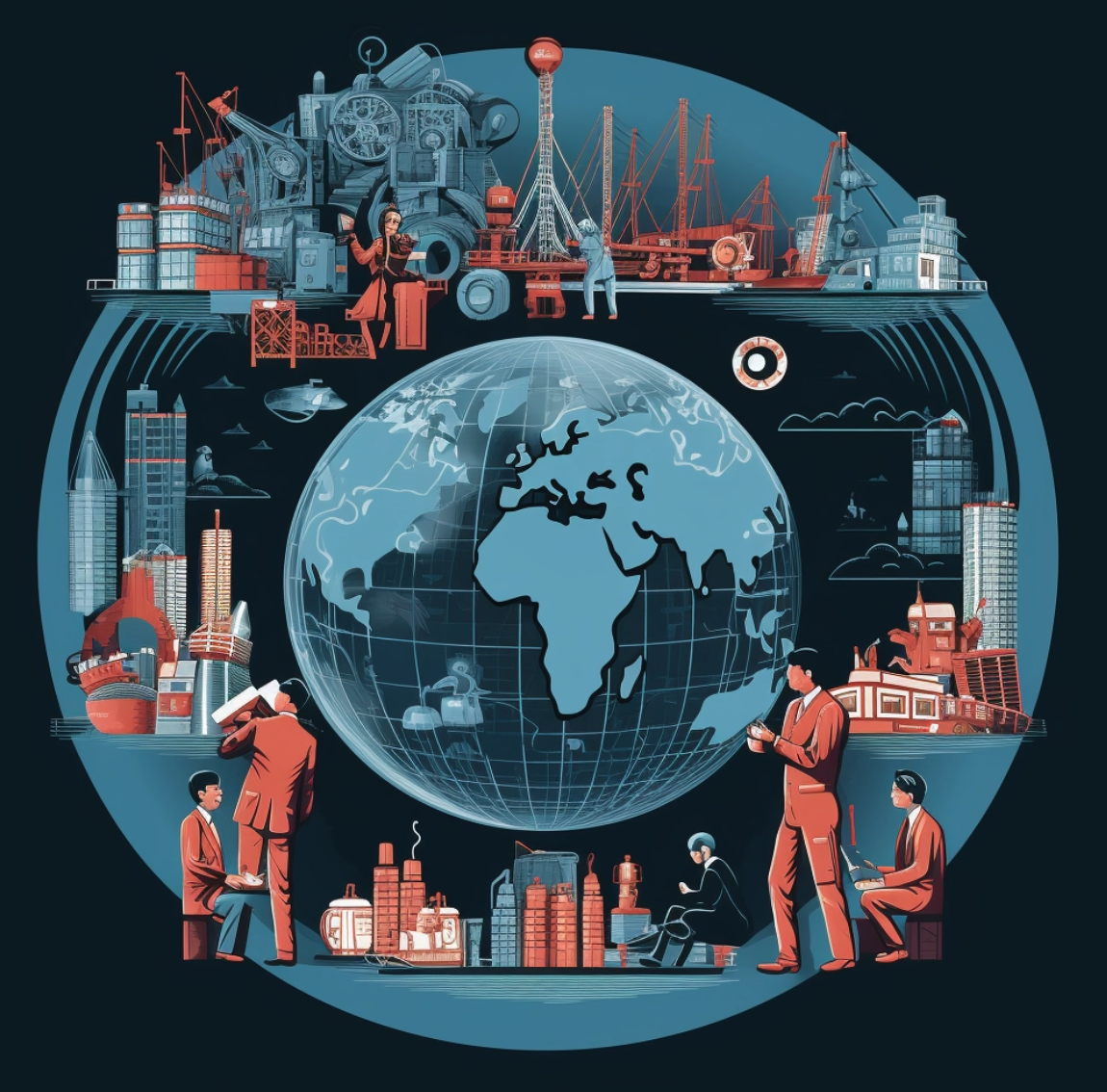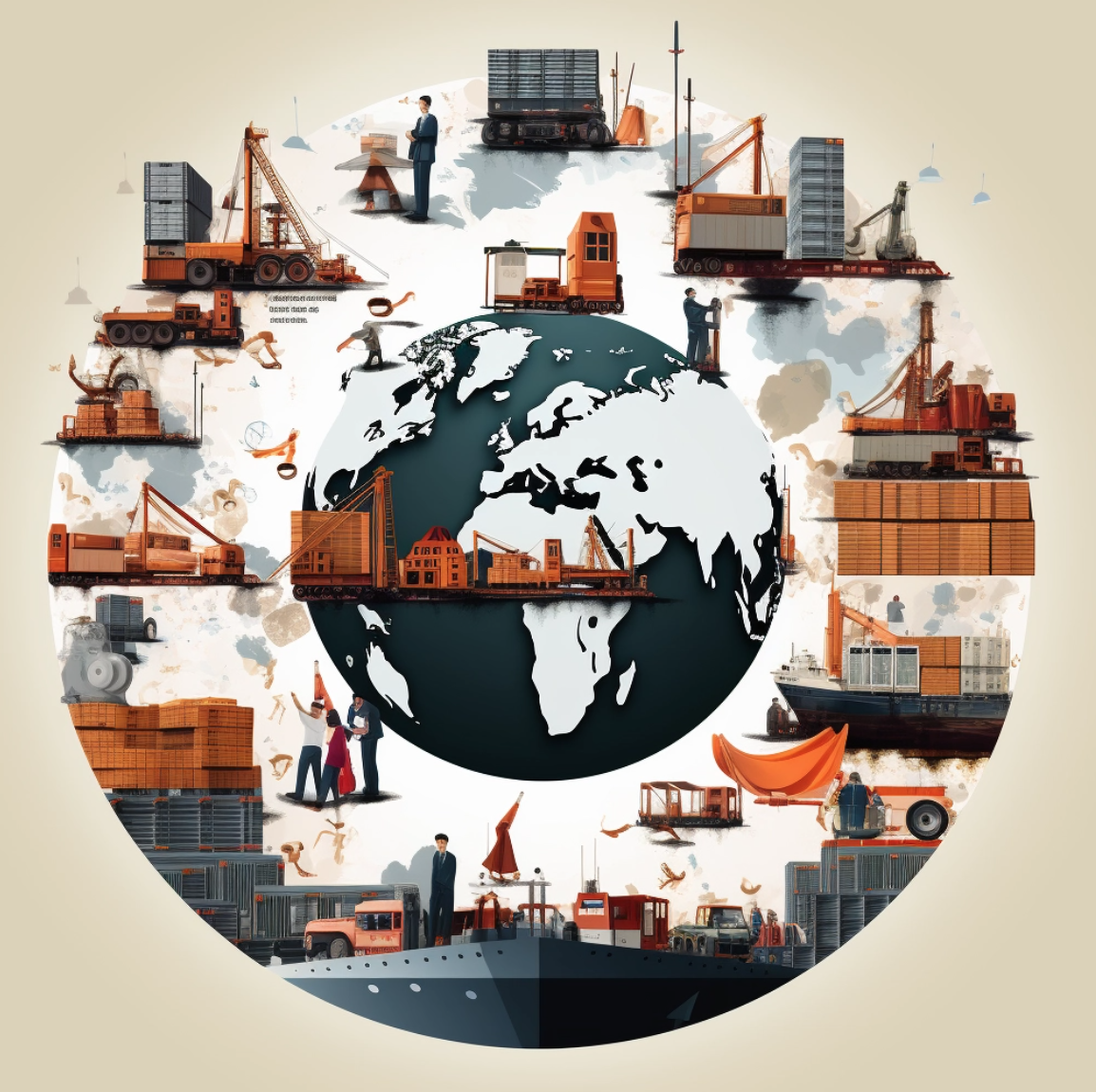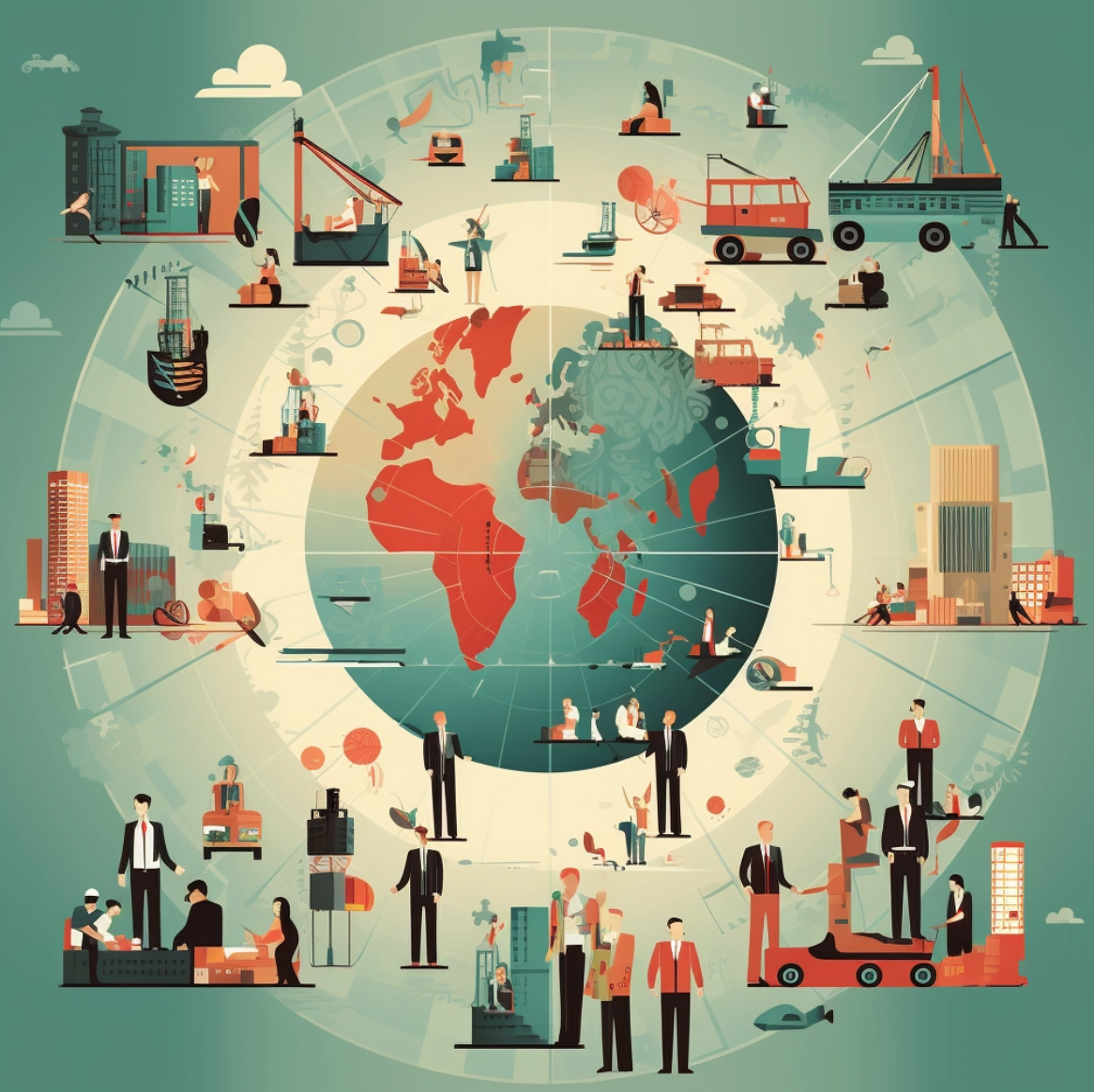How Economic Research Can Shape the Future of Globalization

Ralph Ossa, a professor of Economics at the University of Zurich currently on leave, has been appointed as the WTO chief economist in the most challenging time for the organization.
After the COVID-19 pandemic and the war in Ukraine, the world’s major economies have introduced subsidies and barriers to trade to protect home industries.
National security and the climate crisis offer fresh arguments to legitimize tariffs and non-tariff measures.
In the first World Trade Report since his appointment, Ralph Ossa and his colleagues challenge the prevalent narrative of an inevitable decline of globalization that we have experienced in the last three decades.
The WTO advocates for a “re-globalization”, a new wave of trade integration that offers more opportunities to low-income countries and fosters resilience of industrialized economies thanks to the diversification of sources and markets.
Beyond the World Trade Report, the conversation with Ralph Ossa offers the opportunity to discuss how an institutional appointment shapes the approach of an academic economist, which is something particularly relevant for the Institute of European Policymaking @ Bocconi University whose mission is to create bridges between academia and policymaking.
I'm also happy to talk more generally about this bridge between academia and policy making, cause I've just, I've just switched sides, if you will.
Ralph Ossa, is the WTO your first experience in an international institution’s top job? What is the main difference with your previous academic appointments?
Yes, this is my first experience working for an international organization. I have always tried to be in touch with policymaking, but I have never seen it unfold firsthand.
There are many differences between my current job and my previous academic appointments, but there are two points that I would like to emphasize here.
First, we should all cherish the academic freedom we enjoy at European universities, which allows us to think, write, and publish without any political interference. But second, we should also all understand that this freedom comes with an obligation to ask policy relevant questions – particularly the hard ones that are too sensitive to address in a political environment. This does not happen often enough in academia.
Why is there a lack of connection between the academic debate and the policy discourse?
People tend to work on things that their peers work on and communities of scholars can become echo chambers. I also see some of this happening in the international trade community, where there is a disconnect between the questions asked in academia and the answers needed in the real world.
For example, there is a lot of excitement about quantitative economic geography models these days – and they are fantastic, don't get me wrong. But it is odd for me to see that academic trade conferences are dominated by geography papers at a time when our core subject – trade – is in a deep crisis in the real world.
When policymakers are debating the future of globalization, we as trade scholars cannot pretend that this is none of our concern. We need to get involved – and I do not mean by writing op-eds, but by conducting policy relevant research.
In your experience so far, what is the most effective approach for academics to be relevant in the public sphere?
Policymakers value research much more than I thought. If we ask the right questions and provide meaningful answers, we can have a major impact on the real world.
But this requires that we think hard about the policy implications of our research, instead of only writing them up as a quick afterthought to 75 pages of methodology.
Having said this, we academics often believe that policymakers are just waiting to be informed by our brilliant ideas.
In reality, policymakers have often already made up their minds and only use our research to strengthen their case. In that sense, research can also be abused, and we should be conscious of this risk.
I assume this happens very often when academics discuss international trade issues with policymakers: Tariffs and subsidies are usually inefficient, but sometimes they are politically and sometimes even socially motivated.
As an economist, you need to keep an open mind, and also look beyond the textbooks. I like Ester Duflo’s metaphor of the economist as a plumber: sometimes we need to climb off our high horse and get our hands dirty to really help find solutions that work.
Carbon pricing is an example: if you ask every economist what we should do about climate change, the answer will be that there has to be a carbon price equal to the social cost of carbon, the same in all sectors, the same in all countries.
Before joining the WTO, I would have thought that my job was done in advising policymakers to adopt such a first-best policy. However, we should be open to working on a second-best, a third-best, or even a fifth-best solution if this is the only policy compatible with the constraints faced by policymakers.
For example, a carbon tax may simply not be feasible in the US, but they can introduce green subsidies, so why not support them in doing it the right way?

We academics often believe that policymakers are just waiting to be informed by our brilliant ideas. In reality, policymakers have often already made up their minds and only use our research to strengthen their case
As WTO chief economist, you are uniquely well-positioned to have an impact on how policymakers think about trade and globalization. What is the main message you want to send with the 2023 WTO World Trade Report?
The main goal of our report is to challenge an emerging trade-sceptic narrative. While it is widely acknowledged that trade brings about large efficiency gains, it is increasingly argued that some of these gains need to be sacrificed in pursuit of more important policy objectives, namely, to maintain peace and security, to reduce poverty and inequality, and to build a sustainable economy.
We argue that it is instead crucial to embrace trade if we want to build a more secure, inclusive, and sustainable world.
One could object that an organization dedicated to fostering international trade would never advocate for less economic integration.
We do not argue that trade is the solution to every problem, and we also do not argue that all is good with the current state of trade. However, we show that trade has often been an important part of the solution, contrary to what you hear in the public debate.
Consider, for example, the Covid-19 pandemic. Of course, there were supply chain disruptions at the beginning, and we do not want to minimize that. But trade quickly became an important part of the solution, providing us with the goods we needed most. How did we get the personal protective equipment, the home office furniture, and the vaccines? Through international trade.
More broadly, our point is that you need outside options in a world that is increasingly subject to shocks – be they geopolitical, social, or environmental. And the multilateral trading system gives you such outside options and is thus the best guarantor of economic security.
How do you define the “re-globalization” the report advocates for? Is it a synonym for “globalization of friends”, deeper integration of politically homogenous countries in a more fragmented world?
Re-globalization is about extending economic integration to more economies, people, and issues. For example, we show that the share of bottleneck products, defined as products which have few suppliers but large market shares, has increased sharply in recent years.
We argue that the best way to address this is through re-globalization – in this case by expanding economic integration to more economies.
This requires tackling some of the trade barriers that are still in place. For example, we estimate that the trade costs facing low- and middle-income economies are still 27% higher that the trade costs facing high-income economies.

Before joining the WTO, I would have thought that my job was done in advising policymakers to adopt such a first-best policy. However, we should be open to working on even a fifth-best solution if this is the only policy compatible with the constraints faced by policymakers
In the report, you challenge the widely agreed narrative that globalization is to blame for the increased inequality that boosted the rise of populist movements and leaders, including Brexit and Donald Trump. Why voters were so angry if globalization delivers mainly positive consequences?
We do not deny that some US workers have struggled as a result of import competition from China. This is an important insight of academic research which we need to take very seriously. But we also point out that trade openness can go hand in hand with economic inclusion. Indeed, there is barely any correlation between trade openness and inequality across countries, suggesting that complementary domestic policies are key.
But more importantly, we also have to look at between-country inequality when assessing the relationship between trade and inclusiveness. And then we see that trade has helped hundreds of millions of people escape poverty - in China, Eastern Europe, and elsewhere. I find it baffling how often we lose sight of this basic fact in academia, even referring to the greatest economic miracle of recent history as the "China shock".
If I were a blue-collar worker in the EU or the US I would not feel particularly reassured by this analysis. However, let’s assume that the world economy takes the “re-globalization” path, how do we split the benefits and costs of international trade in this new phase?
We have to make sure that we are not trying to solve yesterday's problems. Import competition from low-wage countries is no longer the most pressing inclusiveness concern in international trade. Instead, we have to think about the opportunities that come with the digital revolution and make sure that as many people as possible benefit.
Digital trade is a huge opportunity for countries and regions that are currently marginalized economically, but it takes a concerted policy effort to leverage it. We need to invest in the right infrastructure, skills, and regulation.

There are environmental gains from trade if countries specialize in what they are relatively "green" at. Economic gains from trade materialize naturally, whereas the environmental gains from trade need to be unlocked by climate policies such as carbon taxes
Is Re-globalization a problem or an opportunity for a multilateral effort to deal with the climate crisis? Transportation is one of the main drivers of the increase in carbon emissions.
All economists agree that there are economic gains from trade if countries specialize in what they are relatively good at.
Similarly, there are also environmental gains from trade if countries specialize in what they are relatively "green" at. The key difference is that the economic gains from trade materialize naturally, whereas the environmental gains from trade need to be unlocked by climate policies such as carbon taxes.
To see this, imagine the effects of a uniform, worldwide carbon tax. A first effect is that prices are going to rise more in more emissions-intensive countries – a reflection of environmental absolute advantage. This will be neutralized by relative wage adjustments and thus leave the pattern of trade unchanged.
A second effect is that prices are going to rise more for more emissions-intensive goods – an implication of environmental comparative advantage. This will make countries specialize in the goods in which they are relatively green at and thus bring about environmental gains from trade.
We have looked at this in a standard quantitative trade model and found that more than one-third of the emissions reductions brought about by a worldwide carbon tax would be due to these environmental gains from trade. International trade is therefore a powerful force multiplier for climate policies.
What do you think of climate-related subsidies? When you look at ambitious policies such as the US IRA, are you more worried about trade distortions or more focused on the potentially high impact on emissions?
It is a good thing that countries are finally taking the climate crisis seriously. And there is even a sound economic case for using subsidies as part of the policy response to the climate crisis, so I am not against subsidies per se.
However, countries have to make sure that they do not create the impression that they disregard WTO subsidy rules when designing their climate policies. Let me suggest an analogy with monetary policy.
Just like central banks have to manage inflation expectations to keep inflation low, we have to manage trade policy expectations to keep trade barriers low. Trade policy uncertainty is highly detrimental to trade flows, which is why it is so important to maintain the credibility of the rules-based trading system.
Let us not forget that the multilateral trading system is still a fundamental pillar of the global economy.
To give just one number, more than 75% of world trade is still conducted under the WTO's "most-favored nation" tariffs, despite the proliferation of preferential trade agreements. This means that the vast majority of world trade still relies on a functioning WTO, and we should be mindful of protecting the integrity of the system.
Upcoming IEP@BU Events
In recent weeks, the governments of Giorgia Meloni and Friedrich Merz have begun promoting a shared economic agenda for the European Union, despite differing approaches to the crisis in transatlantic relations. What are the opportunities, the limits, and the risks of this emerging cooperation?
Una conversazione con Pasquale Terracciano, intervistato da Mariangela Pira.
Una conversazione con Marta Dassù, intervistata da Stefano Feltri
Una conversazione con Marta Cartabia, intervistata da Stefano Feltri
Una conversazione con Simonetta Di Pippo, intervistata da Stefano Feltri
IEP@BU does not express opinions of its own. The opinions expressed in this publication are those of the authors. Any errors or omissions are the responsibility of the authors.
